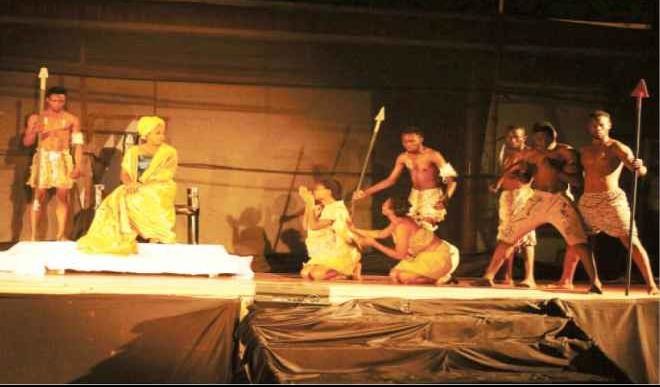The Journey to One: Sacrificial leadership and nation building
John Maxwell’s definition of a leader, “A leader is one who knows the way, shows the way and goes the way” has become my acceptable standard for practical leadership, which is what we have lacked as a nation, especially among the present crop of the political class who parade themselves as our leaders. In Oliver […]


John Maxwell’s definition of a leader, “A leader is one who knows the way, shows the way and goes the way” has become my acceptable standard for practical leadership, which is what we have lacked as a nation, especially among the present crop of the political class who parade themselves as our leaders.
In Oliver Iorkase’s epical play, ‘The Journey to One’, staged at the Nigerian Television Authority’s Arena in Abuja during the weekend of December 1-3 as directed by Hilda Harrison, the need for a leader in the mould of John Maxwell’s definition in the quote above was a central message and this played out in the character of one man, Yondale.
‘The Journey to One’ tells the story of the three nations of Ibotoro, Fua and Orin who inhabit the same land but struggle to overcome the challenges of a heterogeneous nature evident in their conflicting interests, beliefs, religion, tradition, faith, politics and identity among others. They are constantly at each other’s throat.
As dramaturgically created by the playwright and interpreted by Ajayi Akorede in his role as Yondale, who was also known in the course of the play by different names such as Ibuchika, Abolla and Mantu, the leader is an important catalyst to the dream of a nation.
The journey to oneness of the three nations of Ibotoro, Fua and Orin of the Kingsland, and that of the Southern, Eastern, Western and Northern Nigeria requires the sacrifice of a leader who knows the way and is willing, not only to go the way but to show the way as well. With wisdom and diplomacy as his tool, Yondale deploys love as a therapy to heal the wound of a nation who before now abhors one another but turns around to become inseparable and stronger together.
One thing is clear, and that is the message of Oliver Iorkase’s ‘The Journey to One’. For Nigeria to reach her goal of becoming one nation and one people in spite of our diversity, we need the services of leaders who are selfless, intelligent and bold. Leaders whose interests are not pecuniary but collective. Leaders who are focused and have the willpower to remain focused in the face of politics and power struggle. Leaders who are willing and able to make sacrifices, knowing that, according to Yondale in the play, “No future is built without sacrifice, sometimes the ultimate sacrifice. A nation like ours is a concoction. It cannot be served until it is fully cooked. Until then, let it keep cooking, blending, mixing, and becoming one delicious meal. Yes, it is a long concoction, but let us remember still, however long the night, the dawn will break, and at the bottom of patience, we shall find heaven.”
‘The Journey to One’ highlights the capacity of the human mind to achieve whatever it is set to achieve. Whether it is Mohammadu Buhari or Atiku Abubakar, Osita Chidoka or Tope Fasua, Ngozi Okonjo Iweala or Viola Ifenyinwa Okolie, Donald Duke or Yemi Osinbajo, purposeful leadership is simply about high intelligence, willingness, mobility focus, sacrifice and much more as demonstrated by Yondale.
It is important to know that the leader we seek shouldn’t necessarily come from the ruling class. Leadership is a function of intelligence and the willingness to serve and not that of a social class. It took the character, Yondale, a peasant of the Orin nation, which is the smallest of the three nations, to bring about peace to the troubled land and lead them to nationhood and prosperity as they recognize the power of ONENESS.
The play couldn’t have come at a better time when the nation gears up for the forthcoming general elections in 2019, during which most of our leaders at the local, state and national levels would be elected. Like Yondale did for the emergence of Kingsland, Nigeria needs a leader who understands the importance of oneness and the fact that each one needs the other to survive. This play is a must-see for the next crop of Nigeria’s leaders.
Jerry Adesewo is the director of Arojah Royal Theatre in Abuja
